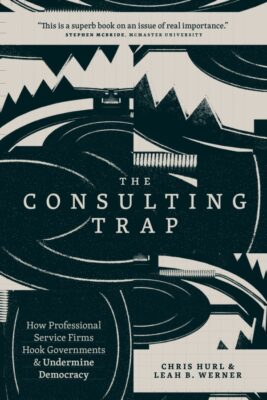In his 1911 book The Principles of Scientific Management, American mechanical engineer Frederick W. Taylor took his engineering knowledge and applied it to the dynamics of the factory floor, keen to reduce processes to quantifiable metrics to cut out inefficiencies. His theory of scientific management spread widely, amounting to what is now often considered the first trend of modern consulting.

The Consulting Trap
How Professional Service Firms Hook Governments and Undermine Democracy
Chris Hurl and Leah B. Werner
Fernwood Publishing
$28.00
paper
196pp
9781773636672
Though Taylor geared his advice towards manufacturing plants, Hurl and Werner – the former an associate professor in the Department of Anthropology and Sociology at Concordia University, the latter a PhD student there – detail the ways scientific management quickly infiltrated the public sector in the early twentieth century. The Consulting Trap is primarily concerned with how transnational professional service firms – the gargantuan, many-tentacled entities that have grown to dominate the consulting field and are referred to throughout the book as TPSFs – managed to entrench themselves within multiple levels of government across the globe, exerting powerful influence over policymaking and the delivery of public services.
The point that Hurl and Werner drive home is that the unrestrained growth of these firms and the convergence of consulting, auditing, and IT services within the arsenal of the biggest TPSFs today – such as McKinsey, KPMG, and Deloitte – have entangled governments in cycles in which they turn to the same consultants to oversee and assess work that public departments increasingly lack the capacity to perform. As the book’s subtitle articulates, this trap is undermining democracy.
Other books and articles have made a similar argument – most recently Mariana Mazzucato and Rosie Collington’s The Big Con, published by Penguin Press last year and cited several times in The Consulting Trap – but Hurl and Werner set out to craft what they present as a “citizen’s guide for understanding and confronting these firms,” intent on distinguishing their book from the literature that casts “the power of consultocracy as monolithic and irreversible.” With a clear organizing structure and sharply direct writing that fuses ideas from a range of disciplines – including economics, political science, law, and others in addition to the authors’ home bases of anthropology and sociology – The Consulting Trap succeeds in its mission. Stuffed with revealing case studies, it lays out the history of modern consulting and the mechanisms through which TPSFs have pervaded the public sphere, concluding with the paths that have been and could be taken in opposing privatized governance.
One of the main points that The Consulting Trap emphasizes is that TPSFs are never as interested in sharing their vast repositories of knowledge as they are in expanding and guarding them, given that their business models rest on claims of exclusive expertise. Through their anthropological lens, Hurl and Werner offer especially perceptive insights into the ways knowledge is produced – how it’s expropriated, monopolized, sold – and how this “political economy of knowledge production” defines our “ways of seeing” public services. If public administration is viewed as something that can simply be outsourced to private companies, its work sequestered behind legal barriers of confidentiality, then civil servants and citizens come to believe they can’t play an active role in shaping the services they provide or use.
Hurl and Werner also make clear that the false claims about outsourcing’s cost savings “[restrict] the democratic mandates of governments by undermining their fiscal capacities.” But where The Consulting Trap could have gone further is in exploring how the negative effects of the undemocratic society upheld by TPSFs are not distributed evenly among a country’s citizens, or the global population at large. It might go without saying that low-income people and those below the poverty line are most dependent on public services and, therefore, the ones most harmed by contractors fumbling the delivery of those services or reducing the funds available for them – but Hurl and Werner don’t dedicate much space to unpacking the ways weakened social infrastructures create disenfranchised populations.
Relatedly, the book contains scattered references to links between the consulting industry and military, border, and carceral systems, without ever extending a unified argument on whether these systems also contribute to undermining democracy. There are connections that can be made between a lack of social support and the likelihood of individuals being caught in a carceral system, or the kind of global economic structures that allow capital to flow across borders and cause drastic wealth disparities while migrants face detainment, yet The Consulting Trap doesn’t make them. After a quote from Serco professes that the firm “specialize[s] in the delivery of essential services,” Hurl and Werner reveal that those services include prisons and detention centres. The authors move on from that point without expressing any thoughts about how “essential” those services are, and the reader is left to wonder whether those two details were placed next to each other to hint at some tacit, meaningful friction between them.
While The Consulting Trap accomplishes a great deal as a citizen’s guide – detailing a pressing issue, the conditions that gave rise to it, and galvanizing forms of collective resistance – perhaps other dots could’ve been connected to delimit the problem’s wider scope and the true height of its stakes.mRb






0 Comments